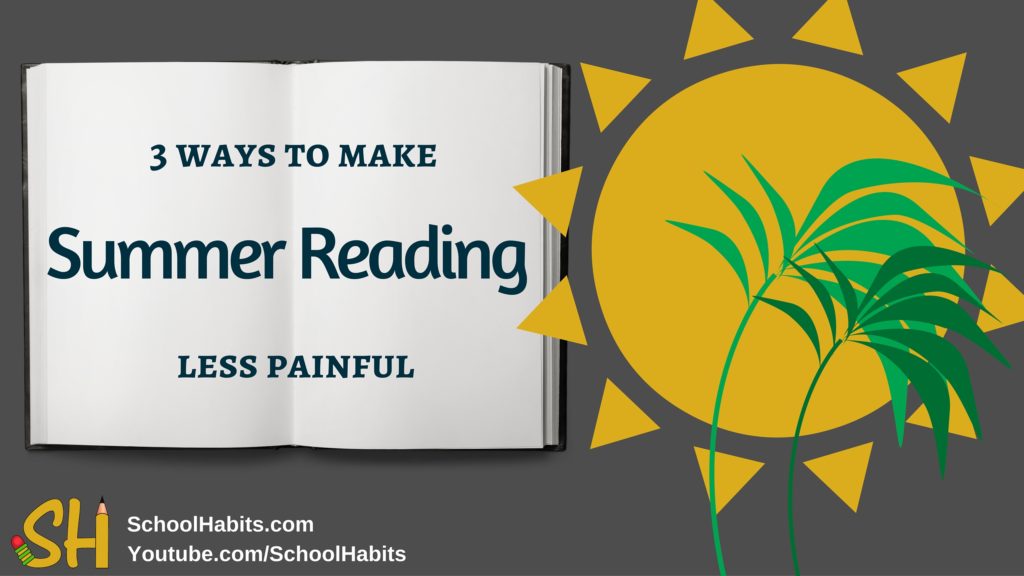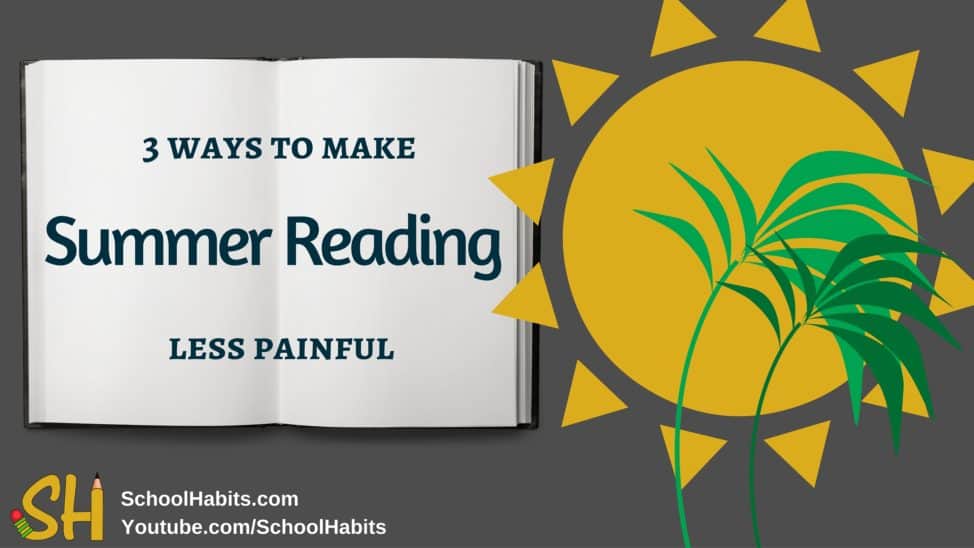
By Katie Azevedo, M.Ed.
Summer reading has a bad reputation. For some people, books and beaches go together as well as pickles and chocolate cake.
(I think both combinations sound just fine, actually.)
But here’s the thing: Summer reading is obligatory, and so you have to do it no matter how you feel about it. I wish I could sprinkle magic I-love-reading-when-it’s-90-degrees fairy dust over students everywhere, but I can’t. So instead, the second best solution is to give you 3 summer reading tips for making summer reading less painful. Here they are:
3 summer reading tips
1. LISTEN TO THE AUDIOBOOK VERSION.
Yes! This is a thing! To any begrudging reader out there, I challenge you to try listening to an audiobook. The experience of listening to a book is so different than that of reading a book, and it’s an experience that many students really find enjoyable. Audiobooks are a great option for any type of learner, but can be particularly helpful for students with ADD, as those students can multitask as they’re listening to the story. In fact, anyone can multitask while listening to an audiobook, as long as the “other” task isn’t too intellectually stimulating.
Many libraries offer free audiobook downloads (right to your phone) that can be checked out just like a traditional paper book.
Or you can try an app like Audible.
2. ANNOTATE AS YOU READ.
If you’re reading a book that you’re not particularly engaged in (aka … summer reading), then you’re likely to zone out while reading. This means you won’t retain any information and you will have to keep re-reading the same page, which means you’ll just wind up hating the book.
(This is what I jokingly/not jokingly call “Fake Reading Syndrome” – when you think you’re reading, but then you get to the end of the page and have no idea what you just read.)
Not good.
But if you annotate while you read, you’re increasing your chances of actually retaining some of the information, which in turn will allow you to settle into the book (ie: not hate it).
What’s annotating?
Here are 11 annotation strategies. But basically, to annotate means to take notes. Simple as that. So while you’re reading (as long as you own your copy of the book), underline key sentences, circle important words, briefly summarize (in 1-2 sentences) each chapter after you read it, and write your own thoughts, reactions and questions in the margins. You can make this fun(ish) by using colored pens, or if you’re not into marking up books, you can use sticky-notes. (Get cool new sticky notes to fun-ify this process.)
Your notes don’t have to be Shakespearean to be effective. In fact, I strongly recommend that you keep your notes and markings simple. The benefits of annotating text are countless.
3. ENGAGE AN AUDIENCE.
Although reading is typically a solo activity, bringing others into the conversation can be seriously helpful. There are various ways you can enlist others to enhance your own experience. Here are a few ideas:
a) Read the same book as a friend, at the same time, but independently. Hold each other accountable to reading a certain amount of pages each day, and casually discuss what you read. Maybe you check in with each other after every 5 chapters, or maybe once or twice a week. Pick a schedule and stick to it.
b) Summarize the story to someone else as you read. Let’s say you read 2 chapters a day – so every night you could recruit some lucky person (Mom? Dad?) to listen to you explain and summarize what you read. This conversation itself will help you process what you read and increase your chances of remembering what you read. I feel like I say this all the time, but one of the best ways to learn is to teach.
c) Read the book with someone else. This isn’t for everyone, but some people find it advantageous to read a book to or with someone else. Perhaps this means you take turns reading aloud to each other. Perhaps it means you’re both reading at the same time in the same room as each other, and asking questions as they come up. This method is more of a group effort than method (a) is, but can really work for some types of learners. Book party, anyone?
Now, if we lived in that fantasy world where I could sprinkle that magic I-love-reading-when-it’s-90-degrees fairy dust over students everywhere, then we would all be reading books that we absolutely loved. And then there’d be no need for summer reading tips and strategies. So consider yourself lucky if your required summer reading list includes books that actually excite you.
For the rest of you stuck reading The Genesis of 16th Century Bureaucratic Ineptitude (jk, I totally made up that awful title), try what I suggest here.
Oh – another way to make summer reading less painful (bonus tip!) …
Don’t wait until the last week of summer to get started. Use my Free Reading Schedule Template to map out your plan.

